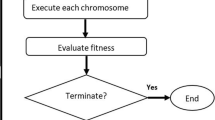Abstract
Data classification is an important task in the field of data mining, which can be used to mine the model of important data and forecast the future trend of those data. Although some breakthroughs have been made in data classification theoretically and technically, there are still some problems, such as lack accuracy of classification modeling algorithm, poor comprehensibility of classification rules and so on. Accuracy improvement and accurate achievement of classification has become hot research topics. Gene expression programming (GEP) has been considered a powerful evolutionary method for data classification. Aiming at the shortage of basic GEP classification algorithm, a novel classification algorithm based on GEP named O_GEPCA has been proposed in this paper. By using this method the initialization and mutation operator adjustment method, calibration set, evolution function and correction strategy will be improved, and the basic GEP classification algorithm will be optimized. The proposed O_GEPCA method shows significantly improvement after comparative study between our proposed O_GEPCA methods and the primitive GEP. The efficiency and capability of our proposed O_GEPCA for data classification will be tested in four well-studied benchmark test cases including card, cancer, heart, glass classification problem demonstrate.















Similar content being viewed by others
Explore related subjects
Discover the latest articles, news and stories from top researchers in related subjects.References
Bartczuk Ł (2016) Gene expression programming in correction modelling of nonlinear dynamic objects. In: Information systems architecture and technology: proceedings of 36th international conference on information systems architecture and technology–ISAT 2015–Part I. Springer, Switzerland, pp 125–134
Dey P, Das AK (2016) A utilization of GEP (gene expression programming) metamodel and PSO (particle swarm optimization) tool to predict and optimize the forced convection around a cylinder. Energy 95:447–458
Ferreira C (2001) Gene expression programming: a new adaptive algorithm for solving problems. Comput Sci 21(2):87–129
Han JW, Kamber M, Pei J (2012) Data mining: concepts and techniques, 3rd edn. Elsevier, Singapore
Hastie T, Tibshirani R, Friedman J (2005) The elements of statistical learning: data mining, inference and prediction. Math Intell 27(2):83–85
Hu JJ, Tang CJ, Duan L et al (2007) The diversification strategy of the initial population of gene expression programming. J comput 30(2):305–310
Jin DD (2014) Research and application of gene expression programming classification algorithm based on particle swarm optimization. Dissertation, Zhejiang University of Technology
Kotsiantis SB (2007) Supervised machine learning: a review of classification techniques. Conference on emerging artificial intelligence applications in computer engineering: real word AI systems with applications in eHealth, HCI, information retrieval and pervasive technologies, IOS Press, pp 3–24
Lee CH, Yang CB, Chen HH (2014) Taiwan stock investment with gene expression programming. Procedia Comput Sci 35:137–146
Li TY, Tang CJ, Wu J et al (2010) Adaptive control algorithm for population diversity in gene expression programming. J Univ Electron Sci Technol 39(2):279–283
Liu HY, Chen J, Chen GQ (2002) A survey of data classification algorithms in data mining. J Tsinghua Univ 42(6):727–730
Mostafa MM, El-Masry AA (2016) Oil price forecasting using gene expression programming and artificial neural network. Econ Model 54(1):40–53
Mousavi SM, Mostafavi ES, Hosseinpour F (2014) Gene expression programming as a basis for new generation of electricity demand prediction models. Comput Ind Eng 74:120–128
Rashidi S, Ranjitkar P (2015) Bus dwell time modeling using gene expression programming. Comput Aided Civ Infrastruct Eng 30(6):478–489
Tang CJ, Chen Y, Zhang H et al (2007) Formula discovery based on transgenosis modified GEP. Comput Appl 27(10):2358–2360
Yang ZL, Chen YM, Tang ZC, Wang JP (2016) Surface EMG based handgrip force predictions using gene expression programming. Neurocomputing 207:568–579
Yuan CA (2006) Research on Key Technologies of intelligent model base based on GEP function. Dissertation, Sichuan University
Yuan CA, Peng YZ, Qin X (2010) Gene expression programming algorithm principle and application. Science Press, Beijing
Zhang H (2006) Research on key technology of transgene in gene expression programming. Dissertation, Sichuan University
Zhong YX, Tang CJ, Chen Y et al (2006) A retrospective strategy to improve the efficiency of gene expression programming discovery knowledge. J Sichuan Univ 43(2):299–304
Zhong JH, Ong YS, Cai WT (2016) Self-Learning gene expression programming. IEEE Trans Evol Comput 20(1):65–80
Zhou Q (2014) Research on classification and clustering based on gene expression programming. Dissertation, Shandong Normal University
Zhou C, Nelson PC, Xiao W et al (2002) Discovery of classification rules by using gene expression programming. In: Proc. of the 2002 Int. Conf. on artificial intelligence (IC-AI’02), Las Vegas, pp 1355–1361
Acknowledgements
This work was partially supported by Science and Technology Project of Guangdong Province of China (Grant Nos. 2017A020224004 and 2016A020212020), Science and Technology Key Project of Guangdong Province of China (Grant Nos. 2016B010110005 and 2014B020205004) and Fund of Natural Science Foundation of Guangdong Province of China (Grant No. 2015GA780062). The authors also gratefully acknowledge the reviewers for their helpful comments and suggestions that helped to improve the presentation.
Author information
Authors and Affiliations
Corresponding author
Rights and permissions
About this article
Cite this article
Yang, L., Li, K., Zhang, W. et al. Optimization of classification algorithm based on gene expression programming. J Ambient Intell Human Comput 15, 1261–1275 (2024). https://doi.org/10.1007/s12652-017-0563-8
Received:
Accepted:
Published:
Issue Date:
DOI: https://doi.org/10.1007/s12652-017-0563-8




